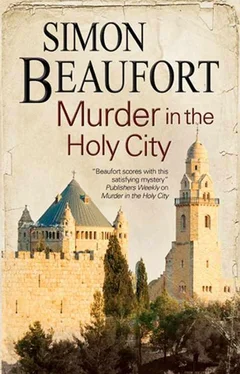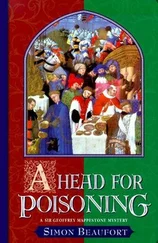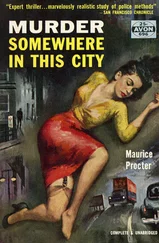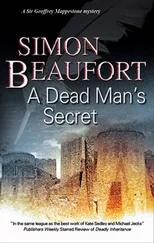Simon Beaufort - Murder in the Holy City
Здесь есть возможность читать онлайн «Simon Beaufort - Murder in the Holy City» весь текст электронной книги совершенно бесплатно (целиком полную версию без сокращений). В некоторых случаях можно слушать аудио, скачать через торрент в формате fb2 и присутствует краткое содержание. Год выпуска: 0101, Жанр: Исторический детектив, на английском языке. Описание произведения, (предисловие) а так же отзывы посетителей доступны на портале библиотеки ЛибКат.
- Название:Murder in the Holy City
- Автор:
- Жанр:
- Год:0101
- ISBN:нет данных
- Рейтинг книги:3 / 5. Голосов: 1
-
Избранное:Добавить в избранное
- Отзывы:
-
Ваша оценка:
- 60
- 1
- 2
- 3
- 4
- 5
Murder in the Holy City: краткое содержание, описание и аннотация
Предлагаем к чтению аннотацию, описание, краткое содержание или предисловие (зависит от того, что написал сам автор книги «Murder in the Holy City»). Если вы не нашли необходимую информацию о книге — напишите в комментариях, мы постараемся отыскать её.
Murder in the Holy City — читать онлайн бесплатно полную книгу (весь текст) целиком
Ниже представлен текст книги, разбитый по страницам. Система сохранения места последней прочитанной страницы, позволяет с удобством читать онлайн бесплатно книгу «Murder in the Holy City», без необходимости каждый раз заново искать на чём Вы остановились. Поставьте закладку, и сможете в любой момент перейти на страницу, на которой закончили чтение.
Интервал:
Закладка:
Geoffrey brought his whirling thoughts under control. “Where was Dunstan killed?”
“At his own desk in the Patriarch’s scriptorium,” the monk answered miserably.
“Did you see anyone there running away or hiding in the shadows?”
Marius blanched, but shook his head. “No. Dunstan missed his meal, you see, and I was concerned that he may have been ill. I looked for him in the dormitory, in the gardens and in the chapel, but he was not there. I could not imagine why he would be in the scriptorium after dark-we need daylight in which to work-but it was the only other place I could think of. The door was open, whereas it is usually locked, and I sensed something was wrong. I entered, and there he was, lying across his desk with the rope tight around his neck.”
“What did you do?”
“Do? What do you mean?”
“Did you examine the body? Did you loosen the rope? Did you shout out?”
Marius looked confused. “I cannot recall. I think I took his hand in mine, but it was cold. Then I ran for my life.”
Geoffrey turned to one of the guards and sent him to fetch Tom Wolfram to saddle their horses-he had walked to the Patriarch’s Palace the night before, but in view of the fact that he had been followed then, he considered it was probably safer to ride and to keep to the wider, more public streets.
Hugh gestured at Marius. “I will see him safely installed in the chapel. No one will harm him in a church.”
“No,” said Geoffrey. “Take him to my chamber. Leave the dog with him. Although the mutt might be useless in any kind of confrontation, his barking might prove a deterrent if the killer desires stealth.”
“I can do better than that,” said Hugh. “I will stay with him myself. I have had rather too much of that excellent wine, but a Norman knight drunk is still worth ten sober Lorrainers, or Hospitallers, or whoever else might come.”
“Careful,” said Geoffrey warningly, seeing fear break out on the monk’s face. He took Hugh’s arm and led him out of the scribe’s hearing. “Talk to Marius. See what you can discover. See if there is anything he did not write on that scroll Tancred gave me that he may have considered unimportant at the time, but that may be relevant now.”
Hugh nodded, but looked uneasy. “Be careful, Geoffrey. If you have not returned by dawn, I will send out a rescue party for you.”
Roger gestured for the guard to open the gates, and they rode out. Wolfram had brought a lamp, and Geoffrey suppressed a sigh of resignation.
“That lamp will provide an excellent target for an archer,” he said, riding next to the young sergeant. “And I see you are not wearing your chain mail again.”
Wolfram glanced at him guiltily and quickly doused the lamp. “I only thought we might need it to see where we are going.”
“Trust your horse, lad,” bellowed Roger from behind. “And learn to read shadows.”
“Read shadows?”
Geoffrey suppressed his impatience. He had been through this lesson with Wolfram before, but the young man was slow to learn.
“Listen to the sounds about you,” he began. “Attune yourself to the noises of the night, so that you will know if they are not right. Feel the mood of your horse. If she is skittish, it might be because she senses a danger you cannot.”
Wolfram nodded, and Geoffrey allowed Roger to take over the lesson while he spurred his horse ahead. The streets were pitch black, for the night had become cloudy and the moon was covered. Someone had been watering a garden, and the smell of wet earth was pungent in the air. Somewhere around his head, an insect sang in a high, whining hum, and further down the street, a cat sat on a high wall and yowled soulfully. Geoffrey thought he heard running footsteps in an alleyway off to the right, and strained his eyes in the darkness to see, but there was nothing.
They reached the Patriarch’s palace without incident and banged on the front gates to be allowed in. The doors were opened almost immediately, and sleepy-eyed Arab boys were roused to take care of the horses. The guard seemed surprised when Geoffrey told him why he had come, and sent for his captain. The captain looked disbelieving, but obligingly led the way to the scriptorium. Geoffrey supposed that Marius had made his discovery and simply fled through an unguarded side door without telling anyone what he had found.
The palace was a fine building set around a large, square courtyard. On one side lay a small chapel and the Patriarch’s sumptuous public rooms, while his private rooms and the accommodation of his retinue were opposite. The scriptorium and the monks’ quarters lay between them, a three-storied building with a refectory on the lowest floor, a dormitory above, and the scriptorium on the top floor, built with large windows to provide maximum daylight.
The captain led Geoffrey and Roger up creaking stairs to the upper floor, past the refectory with its smell of stale grease and the monks’ dormitory with its smell of stale sweat. The scriptorium was in blackness, and obligingly Wolfram kindled his lamp. Geoffrey took it and entered. It was a simple rectangular room with two long rows of desks positioned to take best advantage of the sunlight. Lining the walls between the windows were shelves bearing great brown-edged books and neatly stacked piles of scrolls. The metallic smell of ink pervaded, and the pale wooden floor was alive with multicoloured splashes where it had been spilled.
Draped across one of the desks toward the rear of the room was Brother Dunstan, like a huge black slug with a great arched body. His head flopped down almost to the ground, while his legs stuck out at an angle. The captain gave a sharp intake of breath and muttered that he would have to report this to the Patriarch. Geoffrey waited until his footsteps had faded, and sent Wolfram to prevent anyone else from entering until the Patriarch came. The captain’s incautious flight across the wooden floor had woken the monks in the room below, and already crabby voices were demanding to know what was happening. It would be only a matter of time before they came to investigate, and there were things Geoffrey wanted to do without an audience of monks.
Roger helped him lift Dunstan’s body from the desk and lay it on the floor. Quickly, he opened the storage box on the side of the desk and rummaged through it. In it was a jumble of used scraps of vellum to be scraped clean and used again, old and broken quills, leaking ink pots, and a neatly wrapped parcel of the sickly sweet Greek pastries that Geoffrey detested.
“He will not be needing these any more,” said Roger, leaning past Geoffrey to grab the package and slip it down the front of his surcoat. “Knightly plunder after violent death,” he added in response to Geoffrey’s silent disapproval. “And no different at all to what you are doing,” he concluded, watching Geoffrey stuff the scraps of used vellum down the front of his own surcoat. Geoffrey replaced what he had taken from Dunstan’s box with a handful of scraps from another desk, while Roger watched with raised eyebrows.
Next, Geoffrey knelt by the body and inspected the red weal around the scribe’s neck. The rope used to strangle him was still attached, and it coiled onto the floor around him. Puzzled, Geoffrey frowned, and Roger squatted down next to him.
“What is it?” he whispered, casting a glance toward the door. Out in the courtyard, a commotion had broken out, and there were shouts and the sound of running footsteps.
“This rope,” said Geoffrey, picking up the end and twirling it in his fingers. “It is very thick for strangling, is it not?”
“It did its job,” said Roger soberly.
“I would not use rope like this to strangle someone,” said Geoffrey, studying it intently.
Читать дальшеИнтервал:
Закладка:
Похожие книги на «Murder in the Holy City»
Представляем Вашему вниманию похожие книги на «Murder in the Holy City» списком для выбора. Мы отобрали схожую по названию и смыслу литературу в надежде предоставить читателям больше вариантов отыскать новые, интересные, ещё непрочитанные произведения.
Обсуждение, отзывы о книге «Murder in the Holy City» и просто собственные мнения читателей. Оставьте ваши комментарии, напишите, что Вы думаете о произведении, его смысле или главных героях. Укажите что конкретно понравилось, а что нет, и почему Вы так считаете.












